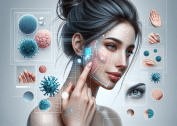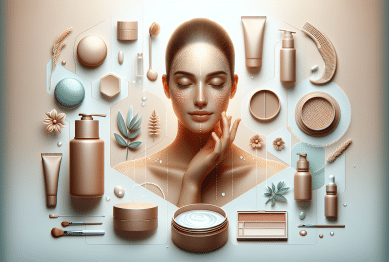Curious about collagen? Discover the unexpected science behind how collagen influences radiant skin, what everyday habits affect your skin’s natural glow, and the lifestyle adjustments people consider for visible results. This comprehensive guide breaks down collagen’s role for beauty lovers, including nutrition and wellness strategies that support skin health.
Why Collagen Matters More Than You Think
Collagen is a crucial protein often linked to plump, youthful skin. It forms the supportive scaffold for the dermis, maintaining resilience and smoothness. As people age, natural collagen production declines, leading to visible changes like fine lines and dryness. In skincare conversations, terms like ‘collagen synthesis’ and ‘skin elasticity’ often arise because this protein helps maintain a soft, radiant facial appearance. Studies have even shown that collagen’s presence influences the way skin reflects light, which directly impacts that coveted glow (Source: https://www.ncbi.nlm.nih.gov/pmc/articles/PMC3583892/).
Beyond its beauty benefits, collagen also supports tissue repair and strengthens connective tissues like tendons and ligaments. This dual role is why collagen is discussed not just among wellness enthusiasts but also athletes and those exploring healthy aging routines. Ingestible supplements and topical ingredients are two popular ways people consider for supporting collagen, but what really works is often debated.
Experts suggest that diet, sun exposure, and stress contribute to collagen breakdown. For example, ultraviolet (UV) rays cause premature aging by breaking down protein fibers that build up the dermal matrix. Adopting mindful lifestyle practices, such as wearing sunscreen and eating plenty of antioxidants, can support the integrity of the skin’s structure. Curious readers continue to explore these strategies to see what influences collagen vibrancy the most.
The Surprising Link Between Collagen And Hydration
Hydration and collagen are closely connected. When skin is well-hydrated, it appears fuller and more youthful. Collagen attracts moisture and holds it in the tissue, making it fundamental to skin that looks supple rather than dull. This synergy means that habits like drinking water, using gentle moisturizers, and consuming hydrating foods can complement collagen’s effects for visible benefits (Source: https://www.aad.org/public/diseases/a-z/skin-care-basics).
Modern skincare routines increasingly focus on ingredients that replenish moisture and support the skin barrier. For example, hyaluronic acid—often used alongside collagen—works to draw water into the skin, which can relieve dryness and enhance texture. This healthy barrier keeps environmental stressors out and prevents loss of hydration, creating ideal conditions for collagen to function optimally within the skin’s deeper layers.
Some research supports the use of dietary changes or supplements aimed at boosting hydration and collagen simultaneously, especially in mature or sensitive skin types. It’s important to consider that lifestyle factors—like caffeine intake and prolonged heat exposure—sometimes counteract efforts to stay hydrated. Therefore, a balanced approach considering both internal and external hydration may help individuals maintain glowing, resilient skin.
Top Foods That Naturally Support Collagen
Nutrition experts frequently discuss certain foods that help support the body’s natural collagen synthesis. Vitamin C-rich fruits like oranges, berries, and kiwi help assemble new collagen, while foods high in zinc, such as pumpkin seeds and seafood, play a vital role in cellular repair (Source: https://www.hsph.harvard.edu/nutritionsource/vitamin-c/). Bone broth, a traditional staple, and lean proteins also contribute amino acids necessary for collagen production.
Glycine, proline, and hydroxyproline—essential amino acids found in animal products and some plant foods—are building blocks of new collagen. People who prefer plant-based diets can look to legumes, nuts, and tofu to provide supportive nutrients. Collagen’s connection to diet is multidimensional, weaving together antioxidants, micronutrients, and even omega-3 fatty acids for all-around skin benefits.
Choosing a colorful, varied diet could be one of the most effective strategies to nurture the skin’s natural structure from within. Health-conscious individuals already look to wholesome, minimally processed foods to fuel their wellness journey, and this approach appears to offer long-term support for both visible skin quality and overall vitality.
Can Collagen Supplements Make A Difference?
Interest in collagen supplements has soared in the beauty and nutrition community. From powders to capsules, various ingestible options promise to support skin elasticity, but scientific consensus remains cautious. Some double-blind studies have shown improved hydration and elasticity in volunteers who consumed hydrolyzed collagen for several weeks (Source: https://www.ncbi.nlm.nih.gov/pmc/articles/PMC7082444/), while others highlight that broader diet and lifestyle factors play a larger role.
It’s also vital to remember that not all collagen supplements are created equal. Bioavailability, sourcing, and dosage differ greatly, meaning results may vary person-to-person. Experts recommend looking for transparent labeling, clinical studies, and guidance from healthcare providers before adding supplements to a beauty protocol. Observing subtle changes over time is generally a more realistic way to gauge impact rather than expecting dramatic, fast results.
Many holistic wellness advocates emphasize that a supplement is most effective when paired with balanced nutrition, consistent hydration, and good skincare habits. Using supplements as one piece of a broader puzzle—rather than a sole solution—might improve the likelihood of experiencing benefits. Paying attention to sleep, stress, and daily sun protection adds another level of thoughtful skin support.
Lifestyle Habits That Influence Collagen Longevity
Everyday choices have a compounding effect on skin vitality. Smoking, excessive alcohol, and unprotected sun exposure are significant factors that can degrade collagen, accelerating the appearance of wrinkles and sagging (Source: https://www.cdc.gov/tobacco/basic_information/health_effects/index.htm). Building healthy habits, such as regular exercise and deliberate UV protection, is valued in wellness circles for supporting resilient, vibrant skin.
Sleep quality is another overlooked driver of collagen renewal. During deep rest, your body repairs damage to skin cells, synthesizing new proteins that restore facial plumpness and clarity. Chronic stress can do the opposite—repeatedly triggering a stress hormone called cortisol, which breaks down collagen fibers over time. Simple stress reduction techniques like yoga, journaling, or mindful breathing have benefited many individuals aiming to preserve their skin’s youthful texture.
Personal care routines matter too. Gentle cleansing, consistent moisturizing, and using broad-spectrum sunscreen all contribute to the preservation of collagen networks. Sharing positive results from adapting such habits encourages community discussion and continuous learning for anyone passionate about long-term wellness and radiant skin.
Professional Treatments And Collagen Stimulation
Some individuals explore professional treatments to boost collagen production and address visible signs of aging. Techniques such as microneedling, laser therapy, and chemical peels are widely discussed for their effects on stimulating the body’s natural regenerative capacity. These options are typically administered by qualified dermatologists and can yield results over a series of sessions, with safety and aftercare being top priorities (Source: https://www.aad.org/public/cosmetic/fillers-botox-etc/skin-resurfacing).
Nearly all professional interventions work by creating tiny controlled injuries or targeted energy delivery to trigger the skin’s repair response. This encourages deeper layers of the dermis to produce new collagen and elastin, resulting in smoother, denser skin texture. Patient suitability, expected downtime, and desired outcomes are key considerations discussed during consultations before proceeding with advanced treatments.
Aftercare is crucial after such procedures. Using fragrance-free, gentle skincare and protecting the treated area from sun exposure helps optimize healing and results. People often report that professional guidance enhances their understanding of what methods best complement their skin type and long-term beauty goals.
References
1. Baumann, L. (2013). Skin ageing and its treatment. Retrieved from https://www.ncbi.nlm.nih.gov/pmc/articles/PMC3583892/
2. American Academy of Dermatology. Skin care basics. Retrieved from https://www.aad.org/public/diseases/a-z/skin-care-basics
3. Harvard T.H. Chan School of Public Health. Vitamin C. Retrieved from https://www.hsph.harvard.edu/nutritionsource/vitamin-c/
4. Choi, F. D., et al. (2019). Oral Collagen Supplementation: A Systematic Review of Dermatological Applications. Retrieved from https://www.ncbi.nlm.nih.gov/pmc/articles/PMC7082444/
5. Centers for Disease Control and Prevention. Health Effects of Cigarette Smoking. Retrieved from https://www.cdc.gov/tobacco/basic_information/health_effects/index.htm
6. U.S. Food and Drug Administration. Collagen and cosmetics. Retrieved from https://www.fda.gov/cosmetics/cosmetic-ingredients/collagen-and-cosmetics










 What Happens When You Train AI With Your Own Data
What Happens When You Train AI With Your Own Data 

